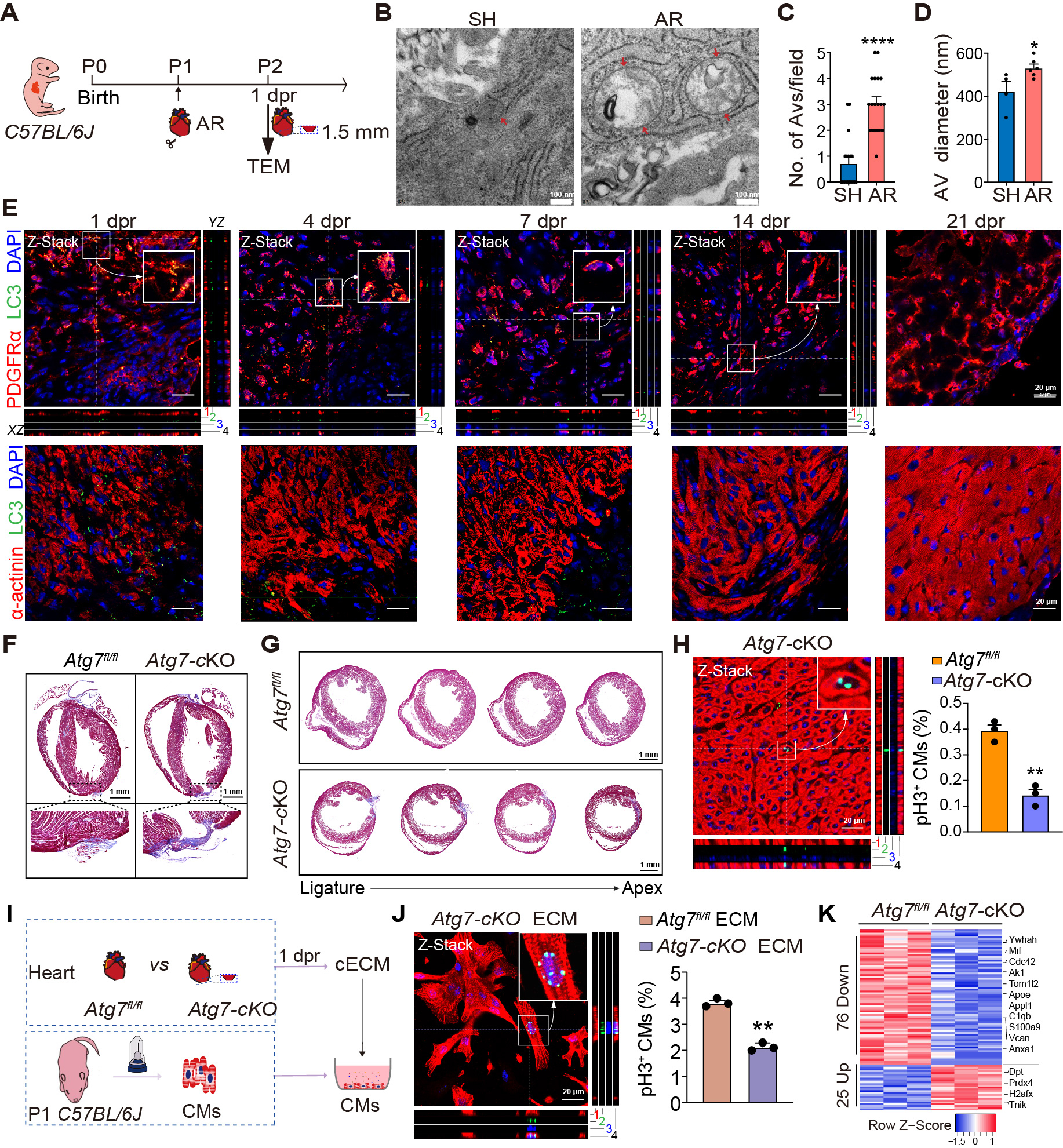Final ID: We009
Cardiac Fibroblast Autophagy Is Required for Neonatal Heart Regeneration
Abstract Body: Introduction
During heart regeneration, a switch between the synthesis, secretion and degradation of extracellular matrix (ECM) is essential, which relies on highly coordinated biosynthetic and catabolic processes. Although many biosynthetic signaling have been identified, catabolic processes in heart regeneration is still largely unexplored.
Hypothesis
Autophagy is a key catabolic process necessary for depredating unwanted cellular components, dysfunctional organelles or aggregated proteins, and providing the needed substances for newly synthesizing ECM. We assessed the hypothesis that autophagy was involved in heart regeneration through regulating ECM remodeling.
Methods
Apical resection (AR) and myocardial infarction (MI) models in neonatal mice were used. Three mouse stains, GFP-LC3tg/+, Atg7fl/fl and Col1a2-2A-CreER mice were induced. Transmission electron microscopy was applied to observe autophagic vesicles. Immunostaining was used to detect autophagy activation and cardiomyocyte proliferation. Cardiac fibrosis was evaluated by Masson staining. Liquid chromatography-mass spectrometry was utilized for ECM components analysis.
Results
We performed AR injury on postnatal day 1 (P1) mice, and observed an obvious increase in the number and size of autophagic vesicles in the injured heart tissue at 1 day post-resection using transmission electron microscopy (TEM). Co-localization analysis of GFP-LC3 with cardiomyocyte marker α-actinin and fibroblast (FB) marker PDGFRα revealed that autophagy was predominantly activated in cardiac FBs following AR. Cardiac FB-specific Atg7 conditional knockout (Atg7-cKO) resulted in impaired heart regeneration after AR or MI injury in neonatal mice, accompanied by reduced cardiomyocyte proliferation. Cardiac ECM (cECM) derived from Atg7-cKO mice hindered cardiomyocyte proliferation compared to Atg7fl/fl mice, indicating that cardiac FB autophagy regulated cardiomyocyte proliferation by modulating the ECM profile. Through liquid chromatography-mass spectrometry analysis, we revealed that cardiac FB-specific Atg7 deficiency induced the downregulation of ECM components associated with regeneration, cell cycle, and muscle cell proliferation.
Conclusion
In conclusion, our research highlights that cardiac FB autophagy plays a crucial role in neonatal heart regeneration by controlling the ECM remodeling. These findings suggest that targeting autophagy could be a promising therapeutic approach for individuals with ischemic heart disease.
During heart regeneration, a switch between the synthesis, secretion and degradation of extracellular matrix (ECM) is essential, which relies on highly coordinated biosynthetic and catabolic processes. Although many biosynthetic signaling have been identified, catabolic processes in heart regeneration is still largely unexplored.
Hypothesis
Autophagy is a key catabolic process necessary for depredating unwanted cellular components, dysfunctional organelles or aggregated proteins, and providing the needed substances for newly synthesizing ECM. We assessed the hypothesis that autophagy was involved in heart regeneration through regulating ECM remodeling.
Methods
Apical resection (AR) and myocardial infarction (MI) models in neonatal mice were used. Three mouse stains, GFP-LC3tg/+, Atg7fl/fl and Col1a2-2A-CreER mice were induced. Transmission electron microscopy was applied to observe autophagic vesicles. Immunostaining was used to detect autophagy activation and cardiomyocyte proliferation. Cardiac fibrosis was evaluated by Masson staining. Liquid chromatography-mass spectrometry was utilized for ECM components analysis.
Results
We performed AR injury on postnatal day 1 (P1) mice, and observed an obvious increase in the number and size of autophagic vesicles in the injured heart tissue at 1 day post-resection using transmission electron microscopy (TEM). Co-localization analysis of GFP-LC3 with cardiomyocyte marker α-actinin and fibroblast (FB) marker PDGFRα revealed that autophagy was predominantly activated in cardiac FBs following AR. Cardiac FB-specific Atg7 conditional knockout (Atg7-cKO) resulted in impaired heart regeneration after AR or MI injury in neonatal mice, accompanied by reduced cardiomyocyte proliferation. Cardiac ECM (cECM) derived from Atg7-cKO mice hindered cardiomyocyte proliferation compared to Atg7fl/fl mice, indicating that cardiac FB autophagy regulated cardiomyocyte proliferation by modulating the ECM profile. Through liquid chromatography-mass spectrometry analysis, we revealed that cardiac FB-specific Atg7 deficiency induced the downregulation of ECM components associated with regeneration, cell cycle, and muscle cell proliferation.
Conclusion
In conclusion, our research highlights that cardiac FB autophagy plays a crucial role in neonatal heart regeneration by controlling the ECM remodeling. These findings suggest that targeting autophagy could be a promising therapeutic approach for individuals with ischemic heart disease.
More abstracts on this topic:
Cardiac-specific mTORC1 Suppression Protects Against the Development of Heart Failure with Preserved Ejection Fraction
Kobak Kamil, King Catherine, Zarzycka Weronika, Peelor Frederick, Miller Benjamin, Chiao Ying Ann
Acute loss of PGC1α in adult cardiomyocytes reduces ischemia-reperfusion injuryHe Lihao, Young Martin E, Rowe Glenn, Prabhu Sumanth, Sethu Palaniappan, Xie Min, Chen Yunxi, Chu Yuxin, Hua Yutao, Cai Junyan, He Jin, Benavides Gloria, Darley-usmar Victor, Ballinger Scott


